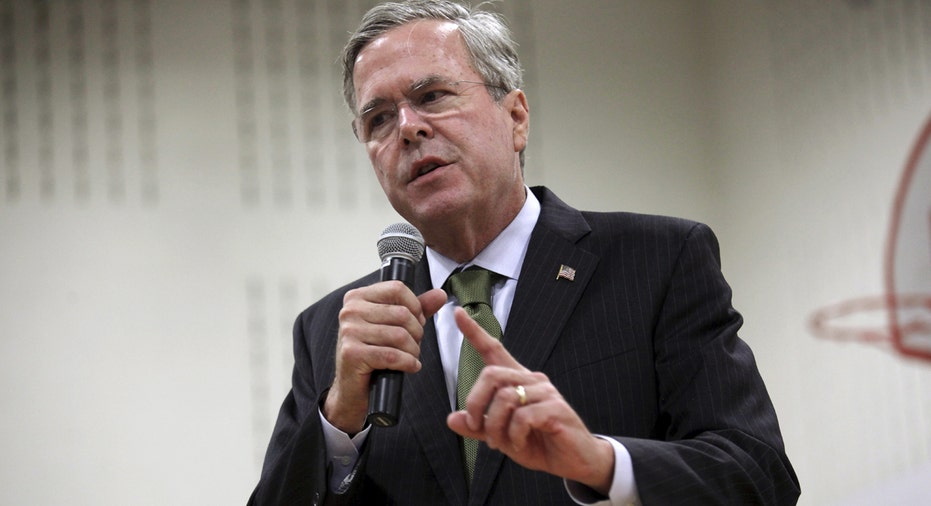Jeb Bush Needs to Flip the Narrative in Tonight’s Debate

The current GOP presidential nomination cycle has received an unprecedented amount of media coverage due to the celebrity nature and historic depth of the field. While the exhaustive analysis has created a sense that the race is entering a mature stage, history tells us it’s only just getting started. At this early juncture, it’s important not to confuse the flavor of the month with a viable candidacy.
Early polls act as a sort of superficial popularity contest, a referendum on the current political establishment. Americans are fed up with the current regime in Washington, and who can blame them. By stumping for political outsiders, poll voters are placing the “customer complaint” vote. However, when the race moves to actual caucuses and primaries, policies start to matter again.
After the farcical sideshow on CNBC, Tuesday’s Fox Business/Wall Street Journal debate will mark a welcome return to discussion of substantive issues. And no candidate can match Jeb Bush for presidential substance. The sooner the primary sheds its celebrity TV cage match vibe, the clearer Jeb’s path to the nomination will become.
Here are three reasons why Jeb remains on course to be the GOP presidential nominee.
1. Jeb remains the most complete candidate
The Republican primary process has so far been without a single consistent front runner, thus creating a moving target for the rest of the field. At the beginning of the process, few knew whether to take Ben Carson and Donald Trump seriously, but as their poll numbers have held strong, so has the scrutiny on their flimsy candidacies. Carson is an impressive doctor, but his policy experience, not to mention his alarmingly creative take on history, is a major concern. His social message plays well in far-right states like Iowa but has little chance of winning a general election. Trump’s divisive rhetoric targets low-information voters and won’t play well with the general public, either.
Perhaps most importantly, the economy remains the most important election issue for voters. In a country still suffering from severe post-traumatic economic stress, the field’s executive experience and economic policy chops leave much to be desired. Jeb not only brings Latino and independent voters into the fold, but his economic record far exceeds that of any other candidates. The quicker he can make the contrast between his accomplishments against the field's dearth of meaningful results, the faster he will climb.
2. Optimism is still a winning formula
Jeb looked uncomfortable attacking Rubio in the last debate because he isn’t a cynical person. He is a relentless optimist. This country was built on positivity and should move forward on a platform of collaboration and inclusion. As the mudslinging in the primary increases, Jeb will further separate himself as the experienced adult in the room. America is already great, but Jeb realizes it could be much greater if the government worked as a tailwind rather than a headwind.
We don’t need another polarizing, inexperienced leader in the White House – we tried that for eight years and the result has been historic income inequality and social unrest. We need someone who will lift up and unite people. The Republican Party needs to stop pitching itself as the party of the rich and white, and instead communicate to all voters that reduced obstruction from the federal government is the best way to empower people and close the wage gap. Jeb is the only candidate with the substantive, optimistic message that is built for the long haul.
3. Momentum is set to turn
Jeb is not only battling a deep field of potential nominees, but also a false media narrative that his campaign is in desperation mode. The only consistent takeaway from polls over the last few months is that the vast majority of primary voters haven’t yet made up their mind. Jeb’s pragmatic message has been drowned out by the celebrities in the race, but he will shine in Tuesday’s economy-focused debate.
Once he can flip that self-fulfilling narrative, Jeb will start to pick up considerable momentum. He, similar to many eventual nominees before him, is not a perfect fit for the demographics in Iowa but will compete there, and he has a deep and experienced team on the ground in New Hampshire. Voters in the Granite State notoriously settle on a preferred candidate late in the process, and I think a strong performance there will ultimately serve as a springboard for securing the nomination. Jeb is at his best connecting with people on the campaign trail rather than trying to be an act in the debate circus.
The fact that voters have issued a rebuke of the insidious political status quo is a long-term positive, but the problems in Washington need to be fixed from within, not by political outsiders learning on the job. “Establishment” candidates almost always face a wave of adversity heading into the Iowa caucus. While I misjudged the early onslaught against credentialed politicians that ended Wisconsin Gov. Scott Walker's candidacy, I believe this tide will shift before the new year. Jeb is well-positioned now to take on the “comeback kid” mantra and chart a course for the nomination.



















